Post
A catch
Save a catch to start your fishing logbook. You will be able to to share it with the community if yo want!
A fishing trip
Post an ad to go fishing with other fishermen
Save a catch to start your fishing logbook. You will be able to to share it with the community if yo want!
Post an ad to go fishing with other fishermen
Share a thought, a question with the community
My favorite cities
×Join our 824 fishermen and our 5 cofishermen in Itchen-Stoke in Hampshire. The fishing forecast is currently 3.7. The most caught fishes here are the silver bream, the pike fish, the river lamprey and the minnow fish. Come try the most famous fishing techniques like the trolling for mahi mahi, angling squid with sardine, slabbing the bass or fishing for pollack with natural baits.
Our fishing forecast of Itchen Stoke indicates the best time to go fishing in this city.
The Silver Bream
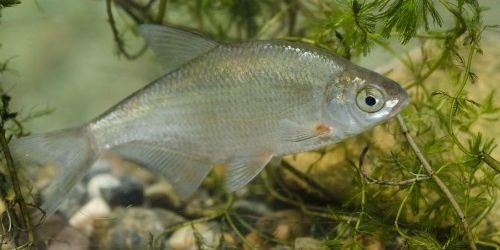
The Silver bream belongs to the Cyprinidae family. The usual size of the Silver bream is 20 to 30 cm and weighs about 200 g. The largest specimens can reach 35 cm. The life span of the Silver bream is about 10 years and it breeds from May to July. The female lays 20,000 to 60,000 eggs. It can be fished all year round. The Silver bream (Blicca bjoerkna) has a high, laterally flattened body, with a bushy back, characteristic of breams and accentuating with age. The head of this bream is small in relation to the size of its body but its eye is quite large, compared to its common cousin. Its snout is short and its mouth is oblique downwards, a characteristic common to fish seeking food on the bottom. The mouth is protractile (it unfolds forward) and free of barbells, surrounded by thick lips. The Silver bream is characterized by a long anal fin with between 22 and 26 rays, although shorter than the fresh water bream (26 to 30 rays). The dorsal fin of the Silver bream is short and high. The caudal fin is strongly indented. The Silver bream has a silvery coloring on the sides and belly, with a dark greyish-green or olive-colored back. The pelvic, pectoral and anal fins have an orange-red color. This last coloring can affect the whole stomach in older Silver breams.
The Silver Bream is a famous fish you can catch in Itchen Stoke.The Pike Fish
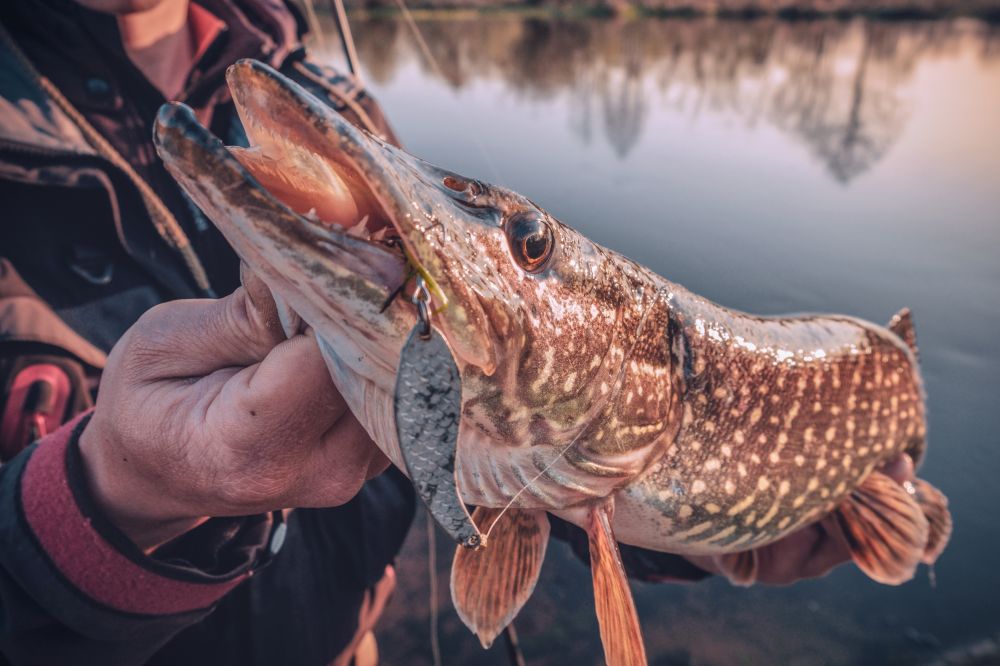
The Pike fish belongs to the Esocidae family. Pike can reach 1.30 m and weigh 25 kg. The current capture size is 50 cm for a weight of 1 kg. Females are commonly larger than males. The longevity is 10 to 14 years for males and 20 years (maximum 30 years) for females. Breeding takes place from February to May. The female lays 15,000 to 45,000 eggs per kg of weight. It is caught from June to December. This species is identifiable by its shape as a rifle bullet. The odd fins are at the back of the animal (allowing a sprinter propulsion). The characteristic head looks like a duck's beak. The mandible is longer than the upper jaw. The color varies from light green to black depending on the dominant color of the colonized habitats. The sides are lighter with darker transverse bands. During growth, the oblique stripes of young people give way to horizontal lines.
The Pike Fish is a famous fish you can catch in Itchen Stoke.The River Lamprey
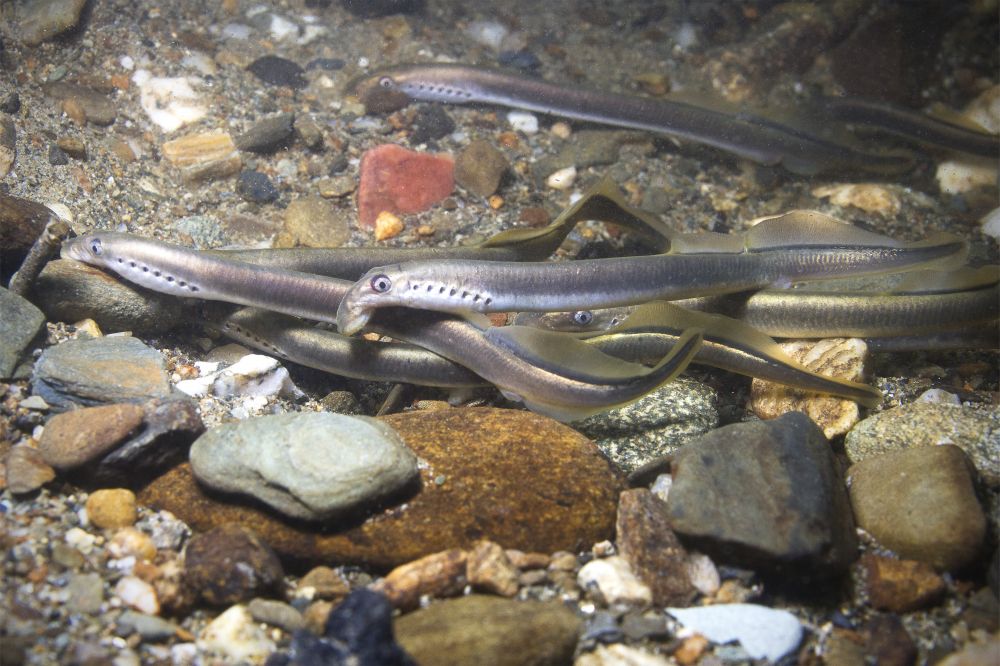
The River Lamprey belongs to the Petromyzontidae family. It measures 18 to 50 cm (average 25 to 35 cm) and weighs 30 to 150 g (average 50 to 70 g). Females are larger than males. The maximum age of the river lamprey is estimated at 10 years. Reproduction takes place between January and May. The number of eggs varies between 4,000 and 40,000. It is caught from January to May. A vertebrate with a cartilaginous skeleton and no jaws, the river lamprey has an anguilliform body, without scales and covered with toxic mucus. Its back is bluish to brownish green. Its sides are greyish, tanned, without mottling. The belly is white. The eyes are very well developed but remain primitive. A single nostril is located between the two eyes. In adults, the circular mouth in the lower position is a suction cup adapted to suction. The buccal disc and tongue are covered with only a few horny denticles, but most of them are strong and acute. On each side of the head, this species has seven pairs of circular gill holes (spiracules). The river lamprey has three fins: one caudal and two dorsal. The two dorsal fins are separated by a small interval, the second being triangular in shape, longer and higher than the first. The larvae are light-colored and its mouth is horseshoe-shaped. His eyes remain hidden under the skin. So it’s blind.
The River Lamprey is a famous fish you can catch in Itchen Stoke.The Minnow fish
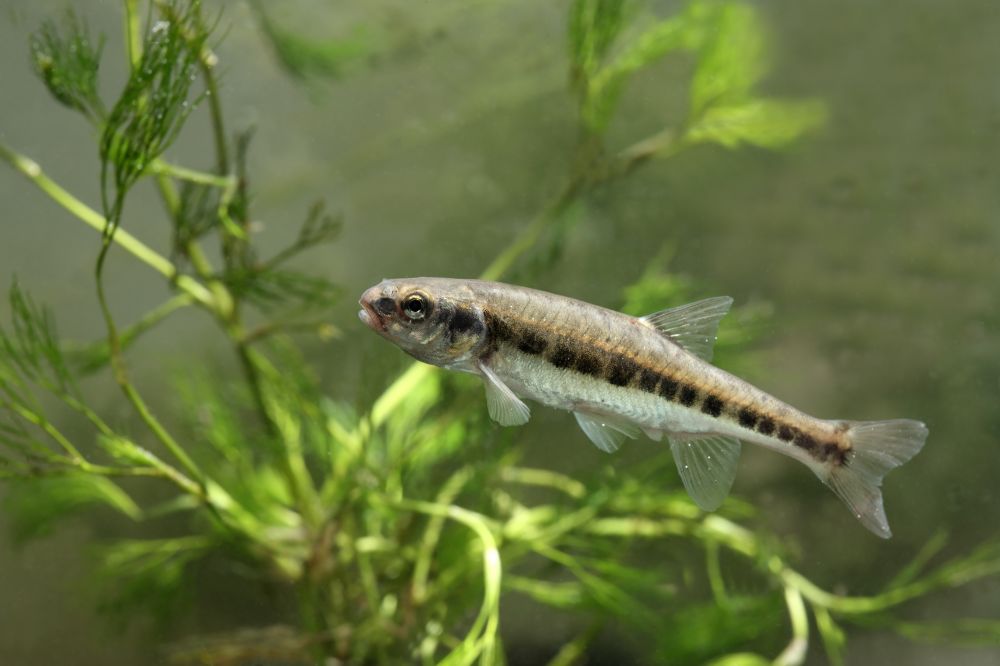
The Minnow fish belongs to the Cyprinidae family. The minnow is a small fish with a length of 4 to 10 cm (maximum 14 cm) and a weight of 3 to 10 g (rarely more than 13 g). Life expectancy is 4 to 5 years (maximum 11 years). Reproduction takes place from April to July or from one region to another. Depending on size, the female lays between 200 and 1000 eggs. It can be fished all year round. It moves in benches. It is often accompanied by trout of the same size and young salmon. The body is shaped like a spindle. The head has a rounded snout, the mouth is terminal (the upper jaw slightly protrudes from the lower jaw). The back is dark green, the upper part of the flanks is light brown with large black-brown spots (sometimes linked to form stripes), while the lower part is yellowish green with silvery highlights, the belly is creamy whitish (in spawning season, it is copper red in males). The lateral line usually only extends to half of the body. The caudal peduncle is compressed laterally. The fins are rounded and transparent. The caudal fin is clearly indented; the ridge is quite high.
The Minnow fish is a famous fish you can catch in Itchen Stoke.The Lesser Spotted Dogfish
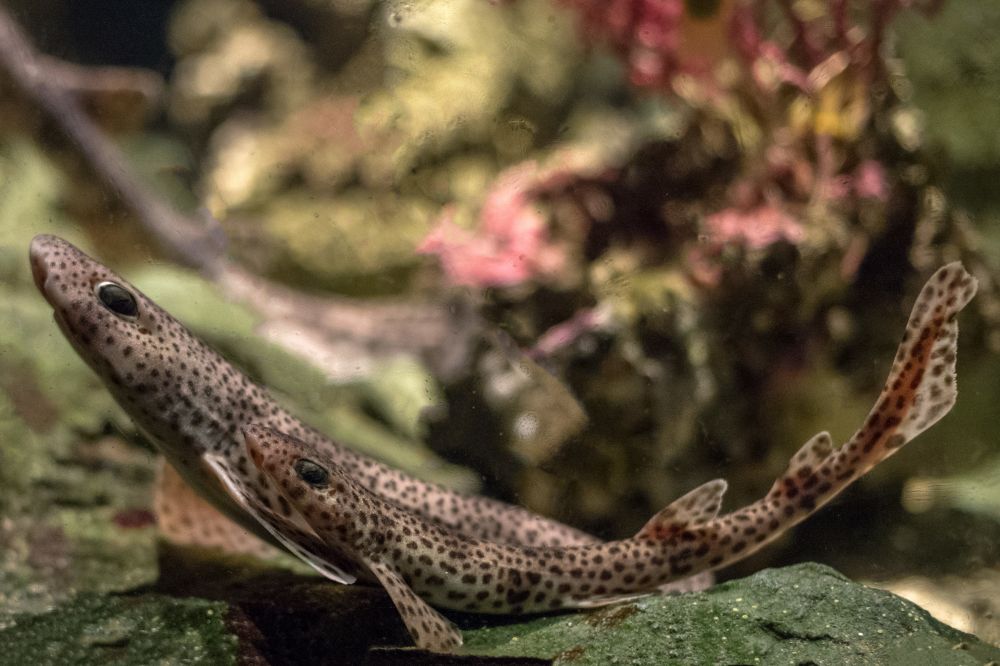
The Lesser Spotted Dogfish belongs to the Scyliorhinidae. It has a height of about 80 cm in length and a maximum weight of 5 kg. It can live up to 8 years. It breeds from November to July. The female lays about a hundred eggs. It is fished in winter. The lesser spotted dogfish is a small spotted shark with a rounded snout. The spots are small, numerous, brown to blackish-brown on a light beige to red background, the belly remains light. Five gill slits are located just behind the black and oval eyes. As with all species of the Scyliorhinidae family, the first dorsal fin D1 is located behind the pelvic fins; the second dorsal fin D2 is located just behind the anal fin. The distance between the 2 dorsal fins D1 and D2 is greater than the length of the base of the anal fin. The nasal valves are contiguous.
The Lesser Spotted Dogfish is a famous fish you can catch in Itchen Stoke.Our fishing forecast of Itchen Stoke indicates the best time to go fishing in this city.
Our fishing forecast of Itchen Stoke indicates the best time to go fishing in this city.
Our fishing forecast of Itchen Stoke indicates the best time to go fishing in this city.
